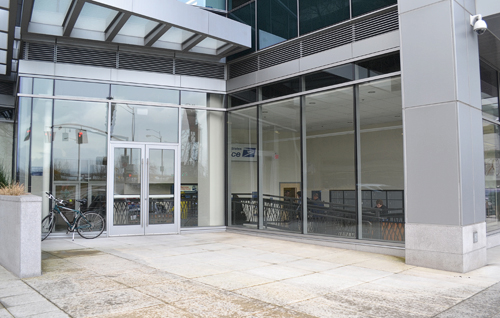
When its lease expired in January, the U.S. Postal Service moved out of its University Station building after decades of occupancy.
After a two-year battle to negotiate new lease terms failed, the Postal Service decided to say goodbye to the city block on Southwest Broadway between Clay and Market streets.
In the final days of January, the new Waterfront Station location opened for business. It’s now about six blocks further from the PSU campus, in the Southwest First Avenue and Main Street building.
“It’s been a big change for a lot of folks,” said Ron Anderson, customer relations coordinator with the Postal Service. “The post office was at University Station for almost 30 years.”
Anderson disclosed that the post office experienced significant financial strain and the move was part of a strategic plan to survive. The new location is smaller and more economical.
“Times change,” Anderson said. “The Postal Service originally moved to University Station because it was growing, but now post offices everywhere are having to consolidate.”
Anderson said that job loss from the transition was minimal; approximately the same number of employees have been retained.
Although it was announced six months ago, some students have been surprised by the change.
Erik Noh, a PSU student studying electrical engineering, was among the very last customers at University Station before the doors closed for good.
“I had not heard at all about the move,” Noh shared. “Having the post office so close to campus has been really convenient.”
Campus mail is now being routed from the new Waterfront Station. It is already fully operational and is the closest full-service post office for PSU students and faculty.
The University Station building is owned by an overseas company based in Germany and is represented by local real estate brokers Ted Durant & Associates.
The plan now appears to be to sell the property rather than lease it. Approximately six months ago, PSU was approached with an opportunity to make an offer to purchase the property. The university declined.
“The primary reason is the land downtown is very expensive and it did not seem an appropriate investment,” said Dan Zalkow, executive director of PSU’s Campus Planning, Construction and Real Estate.
“We would have considered it if there [were] an expansion plan that made sense,” he added.
Zalkow explained that the building’s poor physical condition was also a major factor in the university passing on the purchase of the property.
According to Zalkow, PSU may attempt to acquire the property at some point, but there are no plans for the near future. He said that PSU already owns a few sites with development potential.
Anderson said that the search for a new location was challenging, as there were many prerequisites to be considered. Input was sought through community forums to take public opinion into account.
Requirements for the new post office included central location, street level access and an affordable lease. Waterfront Station fit the bill.
Anderson said he’s optimistic about the new location, but admits it is difficult right now to predict just how successful it will be.
“It’s closer to the downtown core business area but obviously farther from the university, which used the station extensively,” Anderson said. “We hope the relocation will be beneficial and better represent the downtown area.”
What will become of University Station is limited to speculation. For now it sits empty as the history from years of service echoes within its walls.

